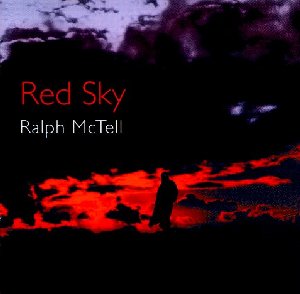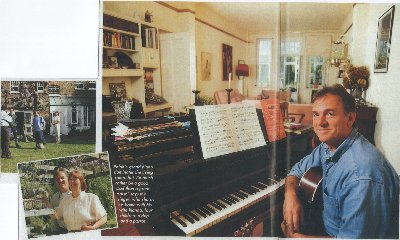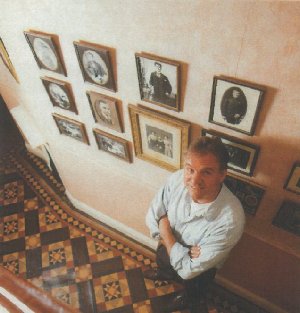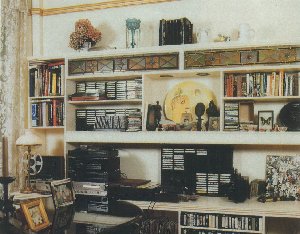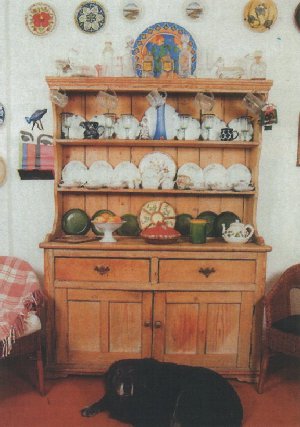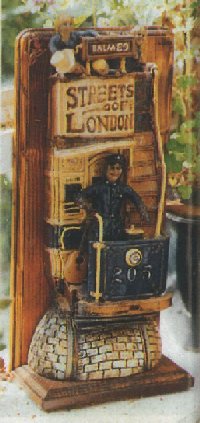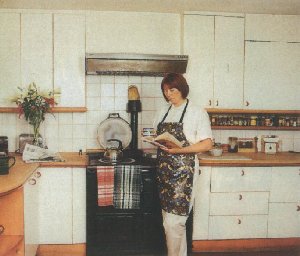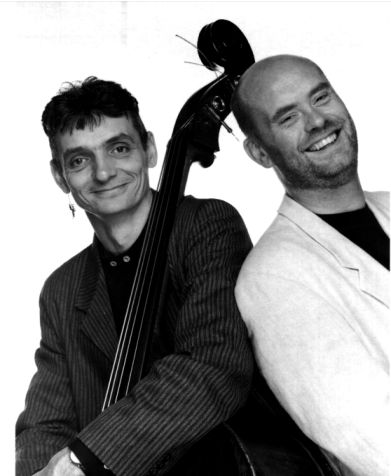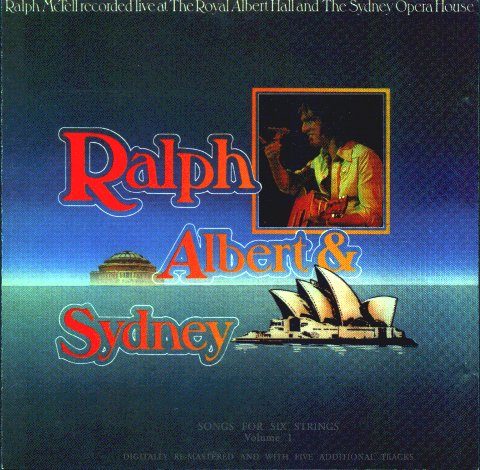 MISCELLANEOUS MAGAZINE ARTICLES Cambridge Memories Jackie-mid 70s Look In - mid 70s
Hello Magazine, 1992 Ralph
McTell on Southsea
Folk Festival 2001 |
RALPH, ALBERT &
SYDNEY PRESS
CUTTINGS ETC.
PRESS
CUTTINGS ETC. Folk singer Ralph McTell eats
several ounces of meat jelly a day, you’ll be thrilled to hear.
He told me that this is because he likes playing his guitar, not with
finger picks, but with his own long and strong nails. “You can’t feel the guitar
properly with picks,” he said. “You’re
not close enough to it somehow.” Ralph’s advice to would-be
guitarists is that after six weeks of a daily jelly diet, you’ll find your
nails in the really good shape that’s needed for guitar work. I checked with Vicki, our Beauty
Editor, and she said that the information is correct.
In fact, she says that if you eat a square of ordinary jelly a day it’s
just as effective and not quite so yucky!
PRESS
CUTTINGS ETC. Ralph was first asked about the
re-issue of ‘Streets of London’, a song he’d written some years ago and
had previously only recorded on an album, although some forty other singers have
recorded cover versions, thus giving the ‘Streets’ a colourful history.
“My manager suggested releasing it as a single,” said Ralph.
“Contracts had prevented that before, but now it was okay, and within a
couple of days the whole thing had been arranged.”
The single itself was not just a re-release – it was treated to a new
arrangement. “Some old friends of
mine helped me out on it,” commented Ralph.
“In fact it was Prelude (the group who had a hit with ‘After The
Goldrush’) while I was on guitar, harmonica and vocals.” STARDOM It was about then that Ralph
spoke about stardom. A few years
ago he had been quoted as saying that he didn’t really desire all the
trappings of “the big time” and he explained that his attitude hadn’t much
differed: “I think being a big star is a state of mind, and if I am a big star
now, my attitude has not changed. I
don’t think I’ve been affected by what’s just happened.
I don’t do star type things – I haven’t got a yacht or a big car,
and I don’t go to clubs or discos, I much prefer pubs actually.” So what is Ralph hoping to base
his future success upon? “It
would be nice if it could be records, but I don’t know whether that will
happen. I’ve always worked as a
touring musician, and I would like that to continue – to get out and meet the
people. But having record success
is good because it’s a secure base for a career.” HALL OF
FAME Despite his non-appearance in
the charts until now, Ralph has packed the Royal Festival Hall and the Royal
Albert Hall in London for his concerts. He
takes his songwriting seriously. “It
can take anything from two days to six months to pen a song,” said Ralph,
“because it’s important for me to make sure the words are right.
Lyrics can take a long time to work out – I get the tune fairly
quickly. The “song” that took
me six months to write was a concept piece called “The Ferryman” – a
mammoth piece of work.” Ralph’s known the hard side of
the business too. In the old days,
he was a busker and used to hitch his way across Europe. It often proved highly unrewarding because more than once he
was arrested by the law, and made to spend the odd night in a prison cell! It was memories of Ralph’s
experiences in Paris that led, oddly enough, to his writing “Streets of
London”. “It was observations
from Paris, coupled with my knowledge of growing up in London, that inspired the
song.” What an inspiration that
has turned out to be . . . If you want to see and hear more
of Ralph McTell, then why not go along and see him on his forthcoming British
tour, which starts this month, and takes in about thirty venues.
He’s come a long way since his busking days . . . FANTASTIC COMPETITION! Ralph
McTell, the man with the
number one hit ‘Streets of London’, has just released his latest album
entitled, ‘Streets’. It’s
full of gentle, lilting numbers similar in style to those that have helped Ralph
pack out the Albert and Festival Halls in London for his concerts. All you have to do to enter this
week’s great record competition is read over the five questions below, and
complete your answers in the spaces provided on the coupon – not forgetting to
include your name, address and age. The senders of the first 25
correct answers pulled from the postbag after Thursday February 20 1975 will
each receive a copy of Ralph McTell’s album. QUESTIONS PRESS
CUTTINGS ETC. Is Ralph a Scot? His birthday? Family background? Ralph’s first job? What first interested him in music? Where did he get his guitar? Is Ralph married? His first performances? When was “Streets of London” written? How long did he have to wait for his first hit? His hobbies? Sport? I enjoyed seeing Ralph on Top Of The Pops.
He certainly doesn’t go in for glitter! How much difference has his hit made to his personal life? Anything he dislikes about showbiz?
Press
Cuttings etc The
scene is one of cosy, domestic bliss as Ralph McTell sits at the head of
the big kitchen table and dishes out home-baked pizza to his wife Nanna
and their four children. The
setting strikes one as oddly incongruous – too comfortably suburban for
a have-guitar-will-travel folk singer who stared his career by busking
around Europe from Paris to Istanbul, who worshipped at the feet of the
legendary American protest singer Woody Guthrie, and who fiercely resisted
every attempt by the music business establishment to turn him into a Top
10 family entertainer. But
as McTell acknowledges with a rather sheepish grin, he has mellowed
considerably since the days when he was so horrified to find himself
unexpectedly at No 1 in the pop charts with his classic Streets of London, that he vanished into exile, threatening never to
play again. It
is only quite recently, he admits, that he has been able to come to terms
with the fact that he can no longer convincingly live up to his own image
of himself as a rebel folk hero. And
it is Alphabet Zoo – the
Monday children’s series on ITV in which he appears, along with Nerys
Hughes, as resident composer and singer of nursery songs – that has
helped to convince this shy, gentle, happy family man that he can afford
to start being himself. “When
the idea of the series first came up I was very hesitant about it because
it represented such a drastic change of direction for me and I was worried
that it would totally blow my credibility on the folk circuit,” he
explains. “But
in the end, I was forced to face some home truths about myself. “In
my mind I was still the same jean-clad, angry young folk and blues singer
that I was back in the Sixties. But
every now and then I see a photograph of myself or catch sight of my
reflection in the shaving mirror and I realise that the public must have a
very different image of me. “I’m
a family man with a nice house who spends a lot of time at home, goes to
the pub occasionally and watches Fulham play football on a Saturday
afternoon. “I’m
36 with a 36-inch waist, I’m part of the older generation and whether I
like it or not I’m an established figure on the music scene. There’s no point in pretending any more. “Once
I had swallowed that there was no problem about saying yes to Alphabet
Zoo. And, as everybody forecast, once I got into it I really
enjoyed working on the programme.” McTell
wrote the 26 songs for the series in less than two months.
“I normally write only 10 or 12 songs in a year, so I was under a
fair bit of pressure,” he says. “Particularly
so when the story-lines started pouring through the letter box day after
day, faster than I could churn out the songs.
In the end I finished the last one on the final day of shooting and
had to sing the lyrics off the autocue.” When
it came to selecting four of the 26 for an EP record, McTell enlisted the
help of his own children – Sam, 15, Leah, 11, Tom, 6 and four-year old
Billy – and some of the children at Billy’s nursery school as a sort
of juke box jury. McTell
has come a long way since, at 17 and with £5 in his pocket and a few
Woody Guthrie songs in his head, he set out on that first European busking
trip. It lasted only two
weeks before he was arrested on Munich railway station and repatriated. On
later excursions he wandered all over Europe with his guitar.
He actually wrote Streets of London while busking in Paris. It
was there that he met Danish-born Nanna.
“She started off as my ‘bottler’,” he says with a grin,
going on to explain that a ‘bottler’ is someone who carries the hat
round for a busker. “I didn’t have one when I arrived in Paris but another busker I met there had two – a Red Indian girl and Nanna – and fortunately he agreed to loan Nanna to me.” The
third song McTell wrote – featured on his debut album, Eight Frames a Second – was called Nanna’s Song, and the couple have been together ever since. With
his quiet, retiring nature, Ralph McTell never had any real desire to push
himself further up the scale of stardom – until recently. “In a way, Alphabet Zoo has opened my eyes. It could be the start of something new and really interesting for me. There is already talk of a new TV series about songwriters and who knows what else may follow?”
PRESS
CUTTINGS ETC. It’s quite a change for the man who grew up in a
council flat in Croydon and spent the early years of his marriage living in a
caravan. “This is a house beyond
my wildest childhood dreams,” says Ralph, who also has a holiday home in
Cornwall. “I remember thinking as
a child how lucky my family was to get a council place. We lived in a pretty squalid flat before we were at last
rehoused after 10 years on the housing list. “It was between two Croydon power stations, and
close to the sewage farm, the glue factory and the council dump.
It was so polluted you had to wipe the clothes line before you could hang
anything out! “I still have to pinch myself to realise I live
here,” he adds. “There’s so
much space and warmth. But I
haven’t changed just because I live in a big house.” Ralph and Nanna, his Norwegian wife of 27 years,
moved into their present home in the mid-70s, but only recently discovered that
Elizabeth Taylor used to live there in the 50s. Their next door neighbour, until two years ago, was ‘King
of Farce’ Brian Rix, and Ralph insists, “No, he didn’t run in and out
slamming doors with his trousers around his ankles!” Ralph still works hard – at the moment he’s
preparing a new album and planning a major project with his close friend, singer
Mary Hopkin. But although he enjoys
making music as much as ever, the main incentive behind it all is his family. “I’d much rather be a good Dad than a great
artist,” says Ralph, who has four children – daughter Leah, 23, and sons
Sam, 27, Tom 17 and Billy, 16. “The
family is very important to me and I’m proud to say that we have a very happy
home here.” The family picture is completed by Kelly, their
elderly dog, and Albert, a talkative parrot, who’s been known to mimic entire
telephone conversations and sing, “Please
release me let me go!” “I’ve always felt that a family should have
pets,” says Ralph. “There’s
such a lot of pleasure to be derived from them.”
However they do have one drawback . . .
“Unfortunately even in a house this size, there’s no peace when the phones
are ringing, the kids are here, the parrot is shrieking and so on.
I find it hard to concentrate on work.” You don’t have to look far to find evidence of
Ralph’s musical career. His grand
piano takes pride of place in the living room where the shelf unit is packed
with records and cassettes. And a
collection of guitars covers an entire wall in his office. “I’ve about 15 guitars now, and although
they’re not very valuable, each one has something special about it for me. “I don’t play loud music,” claims Ralph.
“When I lived in the council flat the only time I could play was when
the neighbours had gone to bed at around two o’clock.
So my songs had to be slow and quiet.” The noisiest place at his present home is the bottom
of the garden, which backs onto a main railway line.
“I sometimes play my guitar there, but the trains
tend to disrupt my thoughts,” he says with a wry smile. Ralph has landscaped his garden and built a pond
which has a familiar shape . . . “Well, I thought I’d done it kidney
shaped”, he claims, “but a friend took one look at it and said, ‘I see
you’ve made your pond like a guitar’. I
can see what he meant but that wasn’t my intention.” With a sizeable house and garden as well as a large
family to look after, Ralph and Nanna lead a busy life.
“We live in a kind of ordered chaos most of the time.
The children are supposed to do certain chores around the house, but they
usually ignore them! Once in a
while they can be bribed to clean one of the windows or something.
Nanna does most things. “This is a busy house,” continues Ralph.
“All the kids’ friends are free to come and go – and they do.
There are always people here at the weekend.” Ralph and Nanna enjoy inviting friends into their
home. “Billy Connolly has been a
friend of mine for 20 odd years and often used to call in for a cup of tea.
He’s a great banjo player and he would sit and play his new tunes for
us. “We’ve had a few monster parties here in the past
few years, although we don’t give as many formal dinner parties as we used
to,” adds Ralph. “I’m a pub
man really, I like to go along to my local for a couple of pints.” The family is clearly blissfully content, and it’s
hard to imagine Ralph and Nanna ever leaving their home.
“It represents all I’ve saved for,” admits Ralph.
“I don’t think Nanna and I could live here without the children, but
if I bring the subject up they all say, ‘You’ve got to stay here, it’s our
home’. “Ideally we’d like either a smaller house in this
area with a little garden, or an apartment, then maybe we could buy a place in a
slightly warmer climate, perhaps France, as well . . . “But wherever else we go, we’d still keep a base
in London,” insists Ralph. “I
feel like a Londoner and I would never leave the place entirely. I just couldn’t do it.”
PRESS
CUTTINGS ETC. PRESS
CUTTINGS ETC. This is the background details ......... Ralph McTell is one of the biggest names in the business and we are delighted
to see him back at the Opera House. This show is part of Ralph's multi date
autumn tour which takes him to very corner of the country, but not Scotland.
Ralph was disappointed that he was unable to get north of the border this time,
but Newcastle is but a stones throw from bonny Scotland and we almost speak the
same language!
PRESS
CUTTINGS ETC. Opener
Stagolee gives the game away in seconds: the blues never sounded so alive. Songs
are drawn from various sources, from vintage bluesmen Mississippi John Hurt and
Robert Johnson to latter-day master Eric Bibb and songwriter Alan Tunbridge.
McTell himself makes composer credits only twice - on an arrangement of
Mendelssohn like you've never heard before, and on his own An Nans Tewl Hyr
Dhe'n Mor (Long Dark Valley To The Sea) - a spooky, resonant piece out on the
edge of Scaryland: McTell standing at the crossroads with Johnson. A couple of
tracks in concert remind us what a class live act he is too: Tunbridge's
National Seven is anchored on Michael Chapman-like echoey picky slides and the
country blues of Blind Boy Fuller's Weeping Willow was never served so well. The
sublime National makes its presence felt like a wild angel on all but a couple
of tracks where McTell's old 1934 Gibson L1 sneaks in, and minimal guesting from
Steve Turner's National, Leah May's BVs and Sam May's harmonium add just a sweet
measure of flavouring. Woody Guthrie's Hard Travelling winds up an album that
reinforces McTell's status as one of the outstanding performers of the acoustic
movement - new or old. Three decades on from Streets Of London, Ralph McTell is
indeed as described by his pal and fan Billy Connolly recently, a National
Treasure. PRESS
CUTTINGS ETC. PRESS
CUTTINGS ETC. Back to Index
PRESS
CUTTINGS ETC.
PRESS
CUTTINGS ETC. They performed a work specially written for Eden. With so much to choose from the trick was to sample as much music as possible, and then take a breather amongst the flowers, walkways and food stalls plying such delicacies as Moroccan lamb, smoked local mackerel and Cornish Ale. I say take a breather because in the warm temperate biodome, location of the Citrus Grove, it was decidedly hot! The yurt occupied by Scavel and Gow offered the chance to cool off and get creative with unusually worded postcards, some of which may well be winging their way towards you. Straight from a gig at The Lugger in Penzance on Sunday night The FOS Brothers hit the main stage at 1 o'clock, with a distinct Irish Celtic feel. Fronted by Dave and Sam McCrory they brought atmospheric mandolin and vocals that were sometimes stirring, sometimes soulful. The material, often traditional, had echoes of Christy Moore. Arrangements were contemporary with strong drum base and dance fusion. Dave and Sam kept up a stream of banter and humour, sometimes tongue in cheek, sometimes black, delivered with a touch of mischief that delighted the audience. The brothers Belfast roots were in evidence in the choice of 'The Ballad of William Bloat', based on a poem by the 60's Shankill road poet Robert Calvert. A rousing version of 'Tipping it up to Nancy', a traditional Irish song that had old and young alike dancing, finished the session. A mad dash then to the Citrus Grove, to catch The Lakeman brothers, settled amongst the strongly contrasting shadows, and heat. The Citrus Grove performance area provides a very intimate space, with the possibility for really strong connection between the listeners and musicians who are literally feet away, and is one of the things that must surely make Eden a unique venue. The Tavistock based brothers, who were one man down, have a very knowledgeable and loyal following, and this was much in evidence. The feel was almost that of a family gathering, with genuine appreciation for the virtuosity and modest delivery from Seth and Sam on the fiddle and acoustic guitar. The music is hard to define, often gentle and rhythmic, understated, strongly instrumental. There is considerable breadth with amongst others French, Cajun and jazz influences. This performance seemed to flow with consummate ease, the audience hanging on every note, and soon Seth was saying 'What a lovely experience it is playing here, a bit new' and introducing the final number. This was penned by Seth, based on a Dartmoor legend, 'Kitty Jay', and was met with rapturous applause. Back to the main stage but a pause on the way to take in Tasmajin, AKA Mary Woodvine, Taz Alexander and Janna Payne. Accompanied only by birdsong from high up in the dome, these 3 ladies delivered smooth Irish harmonies, versions of traditional songs and more modern arrangements by Sinead O'Connor. On the main stage 3 Daft Monkeys burst into action with 'Crimson Eyes' and then 'One of our Monkey's is Missing', from the album Oomin. This was a really innovative and fun performance from Falmouth based Jamie Waters, Athene Roberts, and Tim Ashton. The music is awash with apparent influences, but perhaps the most obvious are Celtic, Russian,Yiddish, Galacian, not to mention two tone. Athene later admitted to me that she had been a bit of an addict for Madness and the timing in a lot of the numbers is very reminiscent of that genre, along with a hint of the bizarre, fun and uplifting drum beat. I even thought I detected a whiff of Richard Thompson, and certainly Jethro Tull. 3 Daft Monkeys are musically very tight, bringing into play a variety of instruments including the penny whistle, 12 string acoustic and electric guitar, recorder and fiddle, and it was no surprise to find that they are classically trained. All three write and collaborate very closely on songs, whilst listening to World Music 'all the time'. Numbers included Weird-ed, Maximillian Brouhaha and a cover of Broyges Tantz ( Mother in laws dance), a traditional wedding song. Definitely a band to see live if you can, and there are plenty of opportunities coming up in the county in September. The evening at Eden on Bank Holiday Monday, and the final hours of this year's sessions, belonged to Show of Hands and Ralph McTell. They were joined by Port Isaac based Fisherman's Friends, and Jenna Witts from Illfracombe. Alone on a stark stage, folded towel and glass of water at his side, dressed in a plain white shirt, white triangles of light glaring down from the few spotlights above, Ralph McTell invoked a poignant image that could have belonged to any era. His music is timeless, the intimate performance speckled with favourites that connected strongly with the audience. McTell is not trendy, rather his appeal is almost enigmatic, but it is such that those packed into the main arena seemed to hold the man in reverence. They listened with rapt attention, and anyone who had to move crept, trying to blend into the dusk lest they disturb the atmosphere. 'The first song is about gardening' he told us, although it wasn't clear if this was the Eden influence….and then a little bit of background story quietly delivered. The tone for the session was set. McTell alone on the stage looked lost in the music as the notes from 'Michael in the Garden' rolled outwards from the stage and little puffs of vapour floated languorously upwards in the lights. 'I'd like to dedicate the next song to Dominic, who has come all the way from Sicily', and friends the Spillers. Please sing along. 'Weather the Storm' and 'Tequila Sunset' followed from the album Right Side Up, and 'Lost boys' from Red Sky, each introduced with its own anecdote. Ralph McTell has been described as a consummate singer-songwriter, and an outstanding guitarist, and this is probably fair, but the essence of his appeal is far more intangible. He sang about life, the dark and the light, the past and the present, and somehow managed to capture in the voice, words and guitar playing the inevitability of it all, the richness and the sorrow. A change of lighting and a change of tempo, Show of Hands opened with a stonking burst of racing fiddle, and then introduced us to the Fisherman's Friends. This 10 piece Port Isaac based singing group specialise in sea shanties. The collaboration with Show of Hands on Tall Ships, from the album Cold Cuts, worked superbly, climaxing with Phil Beer's fiddle almost groaning like the timbers of an ocean going barque. Jenna Witts, from Illfracoombe, joined Steve and Phil on stage. A blossoming talent, she has a lovely strong slightly bluesy voice, and gave promise of things to come when she performed her own composition, Surfers Storm. The boys returned to the stage. 'Santiago' and 'Farewell Angelina' went down well, and the lighting was superb, pulsing through moody blues and greens to electric purple and red. Who could remain unmoved when Phil cut into the chill air, shades of autumn, with a truly ripping version of 'Blind fiddler. Nobody it seemed judging by the rapturous reception. Anything that followed was icing on the cake, and it came in the form of Ralph McTell rejoining the boys on stage for the lovely soul stroking 'From Clare to Here'. I have to confess a slight inward groan when 'The Streets of London' was introduced with some ceremony, but sung unaccompanied with the Fisherman's Friends it had a new feel. The rendition was visually and vocally moving. The new CD 'Country Life' gave us the final number of the day, and what a day it had been! Zest of the West was described as a wonderful experience by the people
I spoke to; they had really loved it. Pressed they waxed lyrical about the
venue, the music, the whole experience. They apparently had no doubt that
we have a lot of 'Zest in the West'! |
